Jewish Propaganda Books in Britain 1908-1948With notes on the Pacifist Movement in unconscious reaction against Jewish wars | War Aims in the Great War | Balfour's Declaration | Penguin Specials | Victor Gollancz's 'Left Book Club' | Controlled, fake opposition: 'Right Book Club' | War Aims in the Second World War | Inferences: Attitudes of Jews to European, and Other, Wars. | Jewish Propaganda After WW2 (just a small sample; Jews against the 'Third World') | [Home Page] |
||||||||||||||||
| Jewish Propaganda Books in Britain 1908-1948 The Jewish push towards wars was strong throughout this period; I've chosen 1908 as the starting date, when Norman Angell's The Great Illusion was published, to 1948, when the Left Book Club was closed. I've included some material on war aims, and shown why these could not be honest. And an extract from Balfour, speaking about five years after his 'Declaration'. All this in my view is a part of the Five-Hundred Years War between Jews and Christians, Jews and whites, Jews and Moslems, Jews and blacks, Jews and Chinese, and other groups, in combination. The timing is a bit arbitrary; I've selected the eighty years' war between Spain and Holland as the start: hence, 'Five-Hundred Years War'. This can be viewed as a genetic internal struggle within the entire human race, with damaging incursions of inbred monomaniac parasites into substrate societies as conditions favoured them. Population densities, genetic characteristics particularly of whites, and technical progress have so far favoured so-called Jews up to a point. How, if at all, this will end remains uncertain. After the establishing of Israel, Jewish activity concentrated on increasing the hold on the USA, partly by use of the fraud of 'nuclear weapons', and by the invention of the 'Cold War' (helped by the Jew Castro in Cuba), which had the function of ensuring the USSR would not be invaded, and the Jewish GULags not investigated. Media control enabled Jews to corrupt every aspect of American life, and to make more money from large-scale state activities, notably by profits from genocide in Vietnam, and by increasing government debt, from which Jews benefited since the paper money they printed recovered huge interest payments, and could largely be directed to what Jews considered were their interests. Later, the Holocaust myth was expanded as a vast money-making and propaganda scheme. All this postdates most of Angell's writings and is very unlikely to have affected them. However it's impossible to be sure of Angell's understanding: the six million figure, and discussions on subjugating Russia, were certainly discussed before his famous book. |
Internal Links:– Jewish Propaganda in UK 1908-1948 - Overview Angell and the World (1908-1938) | Pacifism | Angell after 1914 | Angell's Writing Style | Missing Material | Doubtful Material | Changes in 1938 Edition | Other Books by Angell
War Aims in World War 1
Stanley Unwin & Others
Watts's Thinker's Library
Penguin Specials | More Penguin Books
Gollancz's Left Book Club: Parkinson's naïve note | And Parkinson on Marx, and on the Webbs
Right Book Club: Faked, Controlled Opposition
1942 F K Bieligk Fight for Freedom Publication
Official Army War Aims in World War 2: British Way and Purpose 1942-1944
|
|||||||||||||||
|
This article reviews Norman Angell's The Great Illusion, discusses 'Penguin Specials' and the 'Left Book Club' of Victor Gollancz, and the fake opposition 'Right Book Club'. I also look at Watts's Thinker's Library (1929-1951) which was followed by Allen & Unwin paperbacks.
Ralph Norman Angell Lane THE GREAT ILLUSION - NOW• The Great Illusion was first published in 1908 (& on other publication dates before the 'Great War' starting 1914). It was the most advertised, discussed, and sold 'pacifist' book on supposed causes of wars.• A 1933 edition was rewarded with a 'Nobel Peace Prize' the following year. • The edition reviewed here was printed in December 1938 (described as 'The 1939 Edition'). It consisted of a long introduction, followed by an edited-down version of Angell's pre-Great War book. • Published by Penguin Books Warning: this is a full-on revisionist review, so far as information permits.  Fake pacifist Jewish-concern book, which misled many peace-inclined people. Part of the Jewish propaganda leading to the Second World War with Germany. However, it had the merit of directing attention to economic causes of wars. Fake pacifist Jewish-concern book, which misled many peace-inclined people. Part of the Jewish propaganda leading to the Second World War with Germany. However, it had the merit of directing attention to economic causes of wars.Here I review Norman Angell's books, emphasising the way he switched to anti-Germanism, along with Jewish policy, in the 1930s. I have included notes on war aims, for both world wars, and the reasons that clear statements of them were impossible. I've found a speech of Balfour, made in 1920, and quoted from that. And information on 'Penguin Specials', and an appendix from C N Parkinson's Left Luggage (1967) on Victor Gollancz's so-called 'Left Book Club'. Radio—i.e. in Britain the BBC (British Broadcasting Company, nationalised and renamed the British Broadcasting Corporation in 1926, after the General Strike)—is not dealt with here. Nor are the daily press and magazines, moving pictures, lectures and public meetings, or explicit campaigns of violence. Angell and the World (1908-1938) [ Top of page ] This book (see photo) was a 'Penguin Special'—a series, which continued for many years, of books nominally intended to consider serious issues. In fact from today's viewpoint it obviously presented the Jewish view, insofar as this percolated to the various levels of people who considered themselves 'Jews'. Penguin to some extent supplemented and took over took over from the 'Left Book Club' of Victor Gollancz, which ceased publishing in 1948. See below for the Left Book Club. Norman Angell is now almost a forgotten figure. His surname was Lane; possibly (this is a guess) he dropped the name after a scandal involving Homer Lane, a once-well-known figure in what might now be called 'alternative education'. I'm assuming that Lane was in fact a Jew, on evidence of his names (see the Avotaynu Jewish surname index), the obscurity of his early life, and his writings. Angell was a journalist, roughly equivalent to such people as Tony Benn, George Galloway, Dennis Skinner and others, but there's no modern equivalent, because the Jewish nuclear frauds have made Angell's military assumptions appear to be redundant. H G Wells's Experiment in Autobiography says Lord Northcliffe 'ran' Angell for a while, when it dawned upon Northcliffe's chaotically uninformed mind that newspaper proprietors have responsibilities, after the shattering experience of WW1 showed the 19th century assumption that events would work themselves out by laissez faire had failed. (Northcliffe may have had a parallel in the founders of Youtube—offering home videos of cats and babies, but then exposed to a disconcerting deluge of critiques and social comment). And Angell could be compared with Coudenhave-Kalergi, a propagandist, secretly paid by Jews, for a mestizo Europe. In a similar way, Angell, pretending to be a rational debater trying to avoid war, was a propagandist for Jewish aims. Angell is an interesting example, with such people as Henry George, Hobson, Kidd, Shaw, Belloc, Wells, Russell, H N Brailsford and sundry others, of the ego-centred journalist who never came to grips with critics. These people tended to borrow from each other both with and without acknowledgement; and they could make more money from books and pamphlets and fame than from getting together and hammering out details. At the time Angell wrote, there were no electronic media, so that books, the press, and the free press were the equivalent of preachers and political pamphleteers. And of course as Belloc pointed out, many points of view were censored by the usual processes. Pacifism [ Top of page ] Arguably the first modern pacifist book was Tolstoy's War and Peace (completed 1869), dealing with the Napoleonic Wars and of course the French and others invading Russia. Tolstoy of course had no idea bout the Jewish underpinning of Napoleon; I don't think there's a single Jew in his vast novel. 1889 saw the publication of Baroness von Suttner's 'Die Waffen Nieder' a fictional autobiographical story of 'Martha von Tilling'. As far as I know it was translated into English in 1908 as 'Lay Down Your Arms!'. 1908 seems to have been the publication date of another book on war and peace, 'The Great Illusion' . H N Brailsford wrote that not since Paine and Cobbett had there been a pamphlet that so 'riveted the attention of a continent'. It's possible this publicity reflected Jewish attitudes at the time: the 1903 war of Japan on Russia, financed by Jews, had not been a great success. Jewish assassins had regular kills, but the results, again, were not encouraging to them. Belloc said: 'The immeasurable catastrophe of the war—with which the Jews had nothing to do and which their more important financial representatives did all they could to prevent—fell upon Europe.' Belloc didn't know about, or perhaps didn't notice, the founding of the 'Fed' in 1913, though he did understand war profits made by Jews. One thesis of this review is that Jews, before 1914, stated, or claimed, or protested, that they opposed war in Europe. (The rest of the world, such as China and India and South Africa, was of course liable to pillage). Angell was part of this unlikely claim, and his book was an unsound attempt to debunk warlike ideas. However, after the war and the Russian coup d'état against Russia, Jews gained more practical experience of mass deaths, and, funded by The Federal Reserve and backed by immense Jewish-run propaganda, came more and more to favour war. By 1938, they were very keen for others to fight their wars and die, and Angell follows this pattern precisely. His 1938 book is a tissue of weak analogies and badly-argued bit and pieces; the 1908 edition is much more uncertain. It's very much worth noting Angell's complete absence of feeling for victims, the dead, the massacred, and so on: his entire world is finance, money in circulation, and trade. I suspect this accounts for much of the impact of Angell's book: a large part of the then-education system was descriptive material on wars and empires. Caesar's wars, the Trojan Wars, Agincourt, medieval battles, the glories of Nelson, wars in Africa such as the Ashanti war (1874), flag-wagging, and so on. Many people thought that style of education was wonderful: the late Hugh Trevor-Roper (renamed Lord Dacre) believed, astoundingly to me, that it was the ideal education for public schoolboys with empires to run. The attitude that it's sordid to talk about money when discussing the glories of war must have clashed at a profound level with Angell's work. Both views paid little attention to casualties—and, for officers on the heavily-armed side, this made sense. Angell's popular examination of war as something to be explained rationally looked, at the time, like a breakthrough in economic determinism, weakening the great generals and decisive battles theory. It must have been comparable in influence to J A Hobson's Imperialism (1902), which was obviously fired by the Second Boer War. Hobson was about fifteen years older than both H N Brailsford and Angell. I suggest enthusiasm in the press, which of course was largely Jewish, was a sigh of relief at Angell heading off awkward questions about Jews, South African gold and diamonds, opium, and dead soldiers and Africans. Brailsford's War of Steel and Gold postdates The Great Illusion by about six years, and although it is in many ways, as the title suggests, a more realistic book, it did not mention Jews either. 1900-1914 saw some analysis of Jewish power, but it remained suppressed and unnoticed, rather like early opponents of the Roman Catholic Church. It's fair to say there was no general theory of war and peace. Angell seemed to be a pacifist, and his name was associated with pacifism, but as far as I know no critic realised Angell was part of the concealment of Jewish aims. I may be wrong here; it's likely his name was circulated amongst the few published commentators on Jews, but their works were circulated more or less secretly, could only be reproduced by copying, and never reviewed in the large-scale media. My evidence for his pro-Jewishness is partly that no coherent view emerges: he is difficult to review because of this, so forgive my rather unsuccessful attempt to summarise his morass of half-truths. Angell was advertised as an analyst of war and peace, like Hobson in Imperialism, or a non-technical Lewis Fry Richardson. He complained of being misquoted for over quarter of a century by newspapers, as the 'man who proved war is impossible'. Mechanised warfare was an increasingly obvious menace, even to the most hard-hearted, just as mechanised production and distribution raised new human issues. But, just as the British Labour Party appeared to be serious in tackling work-related issues (but is now, with its record in supporting genocides, mass population transfers, forced race mixing, paedophilia and other evils, clearly seen as a fake) so the pacifists turned out to be a series of intellectual mirage-peddlers. In each case, people concerned about the future were duped, and their time wasted. But they did little. Angell and Events Following 1914 [ Top of page ] The first part of the book (about 100 pages; about half the total) is Angell's comment on his earlier book, and on the state of the world in 1938. His nominal intention is prove he was right thirty years earlier, and presumably therefore a valuable commentator in 1938. (The jacket says 'His forecast [of war and insecurity], and his reasons, then regarded as preposterous, have been verified in every particular.') Let's try to examine this impressive claim. At the start of his book, Angell says In 1914 we [sic] entered war which was to vindicate the rights of small nations (... Serbia ... Belgium...); to remove the menace of Prussian militarism; to end war; to make the world safe for democracies; to make this and other free countries [sic] secure from aggression, and place their economic life on safe foundations. Readers may remember the object of the Second World War was supposedly to come to the assistance of Poland—a war aim immediately dropped when Stalin invaded Poland, and clearly not the aim of war: in fact, the Second World War was to defeat Germany completely, strengthen Stalin, and remove non-US empires, leaving Jews in control. Similarly, we don't have to take Angell's comment very seriously; not only is there no source for it, and not only are there multiple war aims, of which 'war to end war' was a slogan by H G Wells invented only after the war was started. Below is H G Wells on war aims; he was in charge of propaganda in Germany, and presumably knew what happened. Wells had no idea that Jews had any issues. He was baffled by the War Office's refusal to state war aims. But it's clear now that the war aims would not have been acceptable to large numbers of people. The aim to 'place their economic life on safe foundations' presumably means Jewish capital, which the 1913 Fed established as a new factor in modern life. So Angell starts immediately with dishonesty. Events after 1914 are treated from a pro-Jew viewpoint. The introduction of conscription, when after a gung-ho interval young men realised they would die at the front, is not mentioned. The withdrawal of gold currency and the replacement paper ('Bradbury pound'; in Germany, Rentenmark) is not mentioned. Nor is the Bryce Report, a solemnly promoted series of atrocity story lies aimed against Germany. Nor is the German peace offer of 1916. Nor is Balfour's 'Declaration' on Israel: see below for Balfour speaking in 1920 with his 'assured indolence' (H G Wells), and infantile Biblical viewpoint, and the machinations to get the USA into the war. Nor the shipping bait deliberately offered for Germany to sink. Nor the sea blockade, and German starvation. And that's just the wartime period: Angell calls the USSR 'Russia', a common deception at the time, as it was under Jewish control both within and from money controllers outside. The murder of the Tsar's family is not mentioned. The USSR's Jewish money, paid via Lenin and others to foreign companies for weapons and so on, is not mentioned. New York Jews declaration of economic war against Germany, Hitler's opinions, the Great Depression and all the rest go unmentioned. Should Britain's government have declared war on Germany? An interesting possibility (not in Angell) is that Britain might have remained neutral, not declaring war on Germany. After all, Napoleon had invaded the German territories a century before; the Germans fought back sixty years later; Europe had had many wars; why bother about Germany? This was Bertrand Russell's view. But there had of course been a very long preparatory propaganda campaign in Britain against Russia and Germany, the media then (before radio, before TV) being printed, and with some material from speeches, music hall songs and popular education. Here's a comment from Bertrand Russell written about forty years after the 'Great War': '.. the consequences of a German victory in the First War would have been ... less deplorable than the consequences of our victory. ... militarism has steadily increased since 1918. ... democracy has steadily diminished. ... it was followed by an even worse war.' But, as I say, this option is ignored by Angell. A Note on Angell's Writing Style and Claim to Clarity [ Top of page ] Readers who take an interest in Jewish deconstruction will be aware that Jewish writings are generally rambling, confused, and lacking in focus. It's easy to see why: if a writer's aim is to say anything which he/she's been told is in the interest of Jews, it is not likely to appeal to anyone else. Hence the wheedling irresponsible irreleventsia of most Jewish writings. Chomsky, Sontag, Derrida, Freud, and endless media nonentities illustrate the process. A related aspect is the repetition of lies, something recommended by Jewish traditional books. Repetition of approved memes, and omission of other memes, gives many Jewish writers a similar flavour to each other, as they recount the same tired material, singing from the same handouts. Their natural dullness seems to rule out anything original. Even when they do troll, spam, and distractionary work, they don't seem able to do more than ransack the world for old ideas—Jewish spam sites are full of Jesuits, Illuminati, ridiculous anecdotes about Germans, fantasy stories about ill-treatment, hollow or flat earth ideas, endless repeats of slang words, discredited junk of all types. [Here's a shortish footnote from Angell (p. 190) which amused me as being incomprehensible, because of assumptions made: A Bill has been introduced into the Indian Legislative Council enabling the Government to prohibit emigration to any country where the treatment accorded to British Indian subjects was not such as met with the approval of the Governor-General. "As just treatment for free Indians has not been secured," says The Times, "prohibition will undoubtedly be applied against Natal unless the position of free Indians there is ameliorated." —you can say that again!] Angell was 'boomed' (Belloc's and others' word for 'hype') freely. The Penguin cover absurdly states HIS BOOK HAS STOOD THE TEST OF THIRTY YEARS OF CRITICISM AND OF EVENTS. Around page 21 Angell plaintively describes how he tried to persuade everyone of the truth of his views. Angell and his promoters took pains to assure the reader that Angell is a crystal clear writer, though they are less clear why this lucidity should need hundreds of pages of exposition. Tucked away near the end of his 1938 material (p. 106) is this comment: 'Hardly a critic dealing with this book but refers to its clarity and simplicity.' He gives no examples, unsurprisingly perhaps in view of his tedious style. And in his original book we find something similar, worth quoting from: (Pages 136-139) ... complete exposure of the fallacy .. repose[s] .. upon the simplest statement of the plainest facts in the economic life of Europe.. points 1 to 6. Angell claims that only six plain, simple facts are needed to understand his thesis of illusion, 'verified in every particular'. Here they are (edited down; remember they were written around 1908, before the 'Great War')– • [1] An extent of devastation, even approximating to that which Mr. [Frederic] Harrison [in a letter to the Times] foreshadows, as the result of the conquest of Great Britain, could only be inflicted by an invader as a means of punishment costly to himself, or, as the result of an unselfish and expensive desire to inflict misery for the mere joy of inflicting it. Since trade depends upon the existence of natural wealth and a population capable of working it, an invader cannot "utterly destroy it" except by destroying the population, which is not practicable. if he could destroy the population, he would thereby destroy his own market, actual or potential, which would be commercially suicidal. ... • [2] If an invasion by Germany did involve, as Mr Harrison and those who think with him say it would, the "total collapse of the Empire, our trade, and the means of feeding forty millions in these islands ... the disturbance of capital and destruction of credit," German capital would, because of the internationalization and interdependence of modern finance, and so of trade and industry, also disappear in large part, German credit also collapse; ... • [3] For allied reasons the exaction of tribute from a conquered people in our day has become an economic impossibility; the exaction of a large indemnity so difficult and so costly directly and indirectly as to be an extremely disadvantageous operation. • [4] For reasons of a like nature ... it is a physical and economic impossibility to capture the external or carrying trade of another nation by military conquest. ... if Germany conquered Holland, German merchants would still have to meet the competition of the Dutch... the notion that the trade competition of rivals can be disposed of by conquering those rivals being one of the illustrations of the curious optical illusion which lies behind the misconception dominating this subject. • [5] 'The wealth, prosperity and well-being of a nation depend in no way upon its military power, otherwise we should find the commercial prosperity and the economic well-being of the smaller nations, which exercise no such power, manifestly below that of the great nations which control Europe, whereas this is not the case. ... Not only the question of the security of small States, which, it might be urged, is due to treaties of neutrality, is here involved, but the question of whether military power can be turned in a positive sense to economic advantage.' (Pages 207ff) Angell's explanation of Holland, Sweden and so being rich per head doesn't explain why they are left alone; Angell doesn't consider why they aren't simply looted. Angell does seem to recognise that the steppes of Russia or vast plains are hard to defend, which may have something to do with lack of big settlements. Angell doesn't seem to realise building towns and communities is expensive and must incur a long risky interval. • [6] No other nation could gain material advantage by the conquest of the British Colonies, and Great Britain could not suffer material damage by their "loss," however much such "loss" would be regretted on sentimental grounds, and as rendering less easy a certain useful social co-operation between kindred peoples. The use of the word "loss" is misleading. Great Britain does not "own" her Colonies. They are, in fact, independent nations in alliance with the Mother Countries. Analytical Material Missing from Angell [ Top of page ] As can be seen from his six principles, Angell has no fully abstract statements. This of course is in full accordance with Jewish verbal outlook, which usually relies on silly tricks, and has only one object, namely to support what are thought by the simple to be Jewish interests. For example, someone might consider countries A and B, and the effects on them of war with C. How much men and materiel could be expected to be lost on both sides A and B, and to what aim? Would this benefit onloooker C? Or try to analyse out the need for physical objects. Or analyse types of weapons, and see what effects might be predicted if (say) defence gets stronger, or attack gets stronger. Or decide what exactly is meant by 'wealth'. Or by 'finance' and 'interest'. Or the needs for raw materials. Or the conditions in which one group is strong enough to profit from another group. Angell does seem aware of such a need: at the extreme end of his pre-First War book he says, correctly, a new science is needed, of International Polity, the science of the political relationship of human groups. Implicitly he admits to being unable to contribute. Angell's six points are hard to criticise well, because they are at different logical levels and in any case don't fit together or make a complete theory. • [1] Comments on physical destruction, which varies with technical 'progress'. The Jewish myth of 'nuclear weapons' in 1945 or 1946 made this seem out of date; in any case, when it was written, high payload bombing planes were in the future. • [2] Wonders about the collapse of the British Empire, but all Angell says is that credit would be interrupted, as though that's the most important thing. If it is in fact important, maybe because things essential to both sides are essential, he doesn't prove it. • [3] The 'exaction of a large indemnity' proved difficult with Germany, partly because the amounts were miscalculated. (See Keynes 'Economic Consequences of the Peace' on the value of ores, and commentators on the total amount of gold in the world). On the other hand, 'exaction' by central banks have proved extremely rigid and durable. • [4] Looks at trade competitors. It's well-known that there were disputes over tariffs and trade, even to the point of threatening wars. So presumably 'trade competition of rivals' can in fact be affected by military means. • [5] Claims the wealth of a nation depends 'in no way upon its military power', giving such examples as Belgium and Switzerland. A serious investigation might correlate wealth and military power across the world. And back in time, for that matter. Is there 'in no way' any connection? • [6] Says British colonies are independent; I think he says this to pretend the Boer War did not benefit Jews, who owned the new gold and diamond mines, but military power was an essential step; Angell prefers to pretend the mines came into being autonomously. He writes (pp 192-3) that after the Boer War the gold mines 'are owned by shareholders', and pretends that military power was irrelevant! [Pages 206-7 have another five points, on conquests, expanding populations, and large groups as opposed to many smaller groups. He compares north America with many Indian tribes with total populations in 1908, absurdly ignoring technical issues. I haven't included this material, but it shows the same pattern as his six points, i.e. selectively picking bits and pieces] Omissions For a fairly hefty book, Angell's factual omissions include the Monroe Doctrine and its affects on the entire western hemisphere; steel and oil; canals, and air power, and earlier transport systems. The American Civil War is omitted, despite the fact that at the time it was one of the largest recent wars, with financial implications. So is explanation of the Franco-Prussian War. The war of Japan on Russia in 1903 is unmentioned; so is the fact it was financed by Jews. Another oddity is that Hitlerism is there, but not Mussolini, although Mussolini was widely considered at the time to be more 'charismatic' than Hitler. Another highly significant omission is the detail of weaponry and manpower; the sheer cost, which, in view of the primacy Angell gives to costs, needs explanation. In the 1908 book, there's detail on reparations made after Franco-Prussian War, and the (presumed) effects on Germany and France; payments from Europe to U.S.A.; Agadir incident; Boer War. Angell is very careful to ignore war profits. Another oddity is omission of Jean Renoir's 1937 film 'La Grande Illusion'—I'd guess because Jews wanted France to fight for them, rather than be neutral or pacifist. A difficult-to-judge omission is general history. The Norman Conquest is an obvious example. Angell shies away from discussing its effects. He does talk about the heptarchy in England, and 10th century Vikings. He mentions the 'Grand Design of Henry IV - 'perfect save no earthly prince would agree to it'. He has no overview at all of India and the British Empire: Good? Bad? A mess? So Angell's implicit claim to a sort of general-purpose overview fails. For reference, here's a contents list summary of The Great Illusion - Now: PART I: THE GREAT ILLUSION, 1938 RELEVANCE OF THE BOOK TO PRESENT PROBLEMS PART II THE GREAT ILLUSION, 1908-14 [Pp 115-282. In larger type than the rest of the book, suggesting the type hadn't been reset. Edited-out sections not marked] I ECONOMICS AND THE MORAL CASE FOR WAR | II THE ACCEPTED AXIOMS | III THE GREAT ILLUSION | IV THE NEW WORLD AND THE OLD POLITICS | V FOREIGN TRADE AND MILITARY POWER | VI HOW COLONIES ARE OWNED | VII THE INDEMNITY FUTILITY | VIII CONQUEST AND THE POPULATION QUESTION | IX "BUT SOME PROFIT BY WAR" | X HUMAN NATURE AND HUMAN INSTITUTIONS | XI FAITH, FORCE AND THE WORLD'S ORDER | XII WHAT MAKES US FIGHT? AND NEED WE? | XIII CONCLUSIONS PART III THE VERDICT OF THE EVENTS/ THE FINAL MORAL [Pp 277-282] Dubious Material Present in Angell [ Top of page ] I'll try to list questionable material to be found in Angell. That is, assumptions he made, many of them common newspaper currency at the time, which nevertheless are of doubtful truth. Many of these memes persisted for many years, and probably many of them will be recognised by readers. • (Pages 127-134 or 100-114 in the 1908 edition) 'The Accepted Axioms'. This chapter consists of a long list of extracts from books, articles and letters taken from British and German writers, none of them historians or technical experts. The writers are all male; they all omit the US Civil War, the then-recent war of Japan on Russia, even France and Napoleon. They are full of survival stuff, need to fight, importance of navy etc. Certainly the impression is they simply have no serious overview. Because newspapers have some cachet, a bit like the residual feeling that the BBC is worth listening to, newspaper clipping books were popular at the time. The then-equivalent of sound bites or Internet comments. But as analytical material they are not usually of much value. • Weaknesses of democracy: Angell maintains time after time democracies override experts and make mistakes because of their passions. As far as I could find, he gives not one example. Probably this was a typically Jewish attitude; they didn't feel part of any democracy. Page 104: '... the voting millions who do not hesitate ... to over-ride the specialist or expert..' Really? • (page 89) The 'transfer difficulty', '.. goods and services ... difficult to transfer to the creditor [i.e. victor] without financial and economic dislocations..' Angell only considers goods and services. He omits things like slave labour, raw materials, such land as Greek islands, historical treasures, prostitution, constant repeated payments (e.g. Danegeld, though Angell seems not to know about this), slave labour, cash crops for little money (e.g. grain extorted from Ukrainia by Jews in the USSR). Page 145: '... military conquest ... cannot involve a transfer of property from one group of owners to another..' is taken from the pre-war book. I wonder if he changed his mind after Balfour announced the Declaration with its Rothschild link? • 'Britain can't feed itself' was a popular meme at the time. True? False?—Angell has no evidence • (Page 216) Angell says (in effect) that international finance has an interest in stability. From the point of trade, this may be true, but even before 1914 the were obvious possibilities in controlling money to cause depressions, funding wars—as should have been obvious from Napoleon. Angell was unaware of, or a distraction from, the manipulation of money itself. • (Page 243) Angell says that if a state conquers another for (e.g.) warm water access etc, then irredentism invariably follows. (I.e. demand that it be given back). Angell's example is Ireland, at the time part of Britain. But why should that always apply? • Angell has a very dishonest argument about 'dumping': he states that if food etc were stolen, and taken Viking-style back to Britain, and dumped on the market, "we" would complain. This of course assumes the demand is already met. In fact, gems from India, tea, chocolate, silver, mercury, coal stolen from anywhere can add directly to national wealth, just as a household of thieves enriches itself by theft of almost anything. • (Page 252 example) Angell assumes, or pretends to assume, everyone's the same: he evinces no knowledge of Talmudic Jewish anti-white hate. He assumes, or pretends, that civilisation is permanent. Two typical quotations are: 'At one time [in history] we want to eat our enemies, to burn heretics, kill our neighbours in duels, burn negroes'. '.. our forbears regarded as .. right .. human sacrifices, slavery, polygamy, autocracy, judicial torture, the duel'. (p. 271) This of course is a tempting line: many people accept whatever happens in their time. At the time Angell wrote his revised edition, Jews in the USSR had murdered and enslaved and tortured tens of millions. • Angell seems to have no doubt that a people are represented by their government. He doesn't point out (at least in his 1908 edition) that 'government' can be a synonym for oppression. In view of Jewish comments on the Russian Tsardom, this seems odd; probably the ambition of Jews to displace them accounts for Angell's myopia. • Angell looks at the 'human nature' argument (p 225). However, he has no analysis: what if one group can easily overpower another? What about propaganda: Angell believes in spontaneous swings in the public mood, the country becoming excited, calls for this and that, and seems to be unaware of long-term propaganda campaigns backed by money, such as Jews specialise in. But would Britons have wanted to fight Germany without years of propaganda? After many centuries, the Jewish attitude has permeated deeply. But Angell does not consider anything of this sort. he also looks at the Avarice and Greed theory (pp. 92-3), though, again, not in depth. • Angell is tiresomely dishonest about colonisation. He quotes a letter in a newspaper stating that's it's surely obvious that Japan could benefit from gaining control of New Zealand and other territories, and the navy prevents 'her' from doing so. A good test of Angell's work, theoretical and not too personal. But Angell's reply deals only with the Japanese invasion of Manchuria, and even there he treats it as an area to plant Japanese populations in competition with the local Chinese. Angell simply has no overarching theory, with an obviously correct remark which settles the matter. The question about New Zealand was ignored. Changes in 1938 Edition of Angell's 'The Grand Illusion' [ Top of page ] As would be expected, looking back, Angell takes the Jewish side. He wants war, but has to pretend he's being cautious. His book is part of the entire propaganda push for Churchill to start bombing. • He branches into a discussion of 'Nationalism' which is undefined. Topics include e.g. the hypocrisy of Poles over Ukrainia, and Germans over parts of Poland, and Italians over Tyrol etc. No mention of Jews. However, there is a meme which writers of the time often quote, namely that Nationalists in one nation are opposed to Nationalists in another nation. Nationalism leads to war! So nationalism is evil. This is a common theme among Jews. Page 94: '... if there were no sovereign nations, we could not have international war...' Is it true? Well, maybe. But maybe wars were fomented by Jewish money and promises? • Psychology of encirclement: Angell recognises that 'Germany must feel "encircled in iron"..'. The Soviet Union after WW2 claimed it felt 'encircled' though we now know the nuclear aspect was Jewish-run, and deliberately invented. Angell has no way to analyse the problem of bases dotted around the world. • Page 26 gives Angell's views on the 'need for close co-operation with Russia'. (Meaning Stalin's USSR). '... [I]t is patently impossible to create a balance of forces in Europe which can meet the totalitarian challenge without Russia'. This is pro-Jewish, of course. Angell simply ignores mass murders in the USSR, and even pretends it is not 'totalitarian'. • Angell also perhaps spills the beans about China: (p 26) '... aid to the governments of China and Spain engaged in resisting totalitarian invaders..' suggesting that China in addition to Spain of the 'Civil War' were subject to Jewish intervention. Conversely, Angell did • Page 29: Angell talks about the 'Left'. At this time, Angell takes up the idea that the German NSDAP was 'right wing'. On balance Jews in Britain preferred to keep Labour voters deceived about Germany, presumably because they would be needed to fight and die.
OTHER BOOKS BY NORMAN ANGELL [ Top of page ] Four other books by Angell. • 1903 Patriotism under Three Flags: A Plea for Rationalism in Politics on the US war with Spain mostly over the Philippines (Picasso hated this US intervention) and with notes on 'the Dreyfus affair'. My guess is this book was not much read. It may have been written to misdirect from Jewish finance acting through the USA. As far as I know, revisionism of this period is relatively recent, within the USA, though Japan may be a different matter. The false flag explosion of the Maine marked its beginning. • 1928 The Money Game appears to be a large hardback book, but in fact is hollow, containing cards and a game relating to money. I have a copy which I haven't examined carefully. But no doubt there is careful avoidance of Jewish issues—that's my hypothesis. • 1939 You and the Refugee by Sir Norman Angell & Dorothy Buxton. 'Refugees' do not of course include displaced Russians or Germans or Chinese or Indians or French. The subtext is: Jews only. Or Jews first; typing this now (2019) it's clear that displacement of whites is a Jewish aim. H G Wells reviewed this book, with some irritation: Sir Norman Angell and Mrs. Dorothy Frances Buxton, in a very clear and almost pressingly persuasive book, You and the Refugee (Penguin Books, 1939), argue for a practically unrestrained admission of these outcasts. They show in particular how beneficial a large refugee immigration might be to the British Empire. It would bring in new trades, new skill, find fresh work for the unemployed, and in Great Britain arrest the approaching decline in population - if that is desirable. Their plea for a more generous treatment of refugees, so far as assimilable individuals are concerned, is unanswerable. [If the stories are true, and if other stories haven't been censored—rerevisionist] But our authors' arguments for an inassimilable immigration en bloc are less convincing. That would only renew the trouble at a later date. There is no time to begin that old history again in new regions and among fresh difficulties. Disaster is advancing too rapidly upon our entire species. Jewish nationalism like every other nationalism must end and end soon... • 1947 The Steep Places is a miscellaneous book by someone no longer taken very seriously. He couldn't decide whether colonies still existed or not; whether Stalin should be opposed or not; whether military alliances should exist (or could - he must have believed in atom bombs); whether the USA had a new empire, or not; whether 'reds' were good, or not; what to make of historians like Nevins and Commager; what to make of Americans and the 'Ancient Grudge' against Britain. I think he must have been excluded from the central Jewish decision makers.
BALFOUR ON GREAT BRITAIN AND ZIONISM
[ Top of page ] Speech at the Albert Hall at a Demonstration organised by the English Zionist Federation, to thank the British Government for a decision to incorporate the Balfour Declaration for a Jewish National Home in the Treaty of Peace with Turkey. July 12th, 1920. From Speeches and Addresses of the Earl of Balfour KG, OM, FRS 1910-1927 [Balfour speaks:] For long I have been a convinced Zionist, and it is in that character that I come before you to-day, though in my most sanguine moments I never foresaw, never even conceived, the possibility that the great work of Palestinian reconstruction would happen so soon, or that indeed it was likely to happen in my own lifetime. This is one of the great and unexpected results of the world struggle which has just come to an end—even if, indeed, we dare to say that it has yet completely come to an end. Of infinite evils that struggle has been the parent, but if among its results we can count the re-establishment in their ancient home of the Jewish people, at all events we can put to its credit one great result which under other circumstances, so far as we can see, could never have occurred at so early a date. Who would have thought five or six years ago that a speaker in the Albert Hall would be able to recount as an established fact that the Great Powers of the world had elected to accept the Declaration to which Lord Rothschild has referred, had consented to give a Mandate to the country which at all events is in the forefront among those who desire to see this policy brought to a successful issue, and that they would already have seen appointed as the High Commissioner of Palestine a man who so admirably joins the double qualifications which Lord Rothschild has so felicitously expressed? ...
H G WELLS ON WAR AIMS DURING THE GREAT WAR
[ Top of page ] Taken from THE OUTLOOK FOR HOMO SAPIENS; Readers Union copy 1942. H G Wells's own account of the First World War, and his attempt to get a statement of war aims. Of course, from a modern perspective, support of Jewish aims and money-making for Jews, and this sort of thing made up the true war aims, would not be acceptable. Wells, naïvely unaware of secret Jewish pressure, must have been treated as a propagandist, all the more useful because he had no idea of hidden forces. Hence the varying and obviously insincere claims made after th war. '... As the first world war unfolded my mind was increasingly obsessed by the problem of how the war would end and what would come after the war. Imaginative people were guessing and inferring and making plans. The word "plan" became more and more frequent; at length no newspaper was complete without it. A Ministry of Foresight was suggested. We busied ourselves in making the New Map of Europe, the New Map of the World. The idea of a "League of Nations" emerged amidst this ferment of anticipatory projects. An interesting phase in all this forward-looking peering was the War Aims controversy. I happened to be working in Northcliffe's Ministry of Propaganda in Enemy Countries [See 'See Secrets of Crewe House' by Sir Campbell Stuart.] I was in particular directing the propaganda in Germany, and, in co-operation with Dr. J. W. Headlam-Morley, I induced our Crewe House colleagues to draw up a memorandum upon the allied war aims and submit it to the Foreign Office for endorsement. "This", we said, "is what we suppose we are fighting for, and if we can get this we shall be satisfied and the war will be at an end. Is that so? We cannot go on with our work properly unless we know its objective." The War Office was profoundly shocked. Whatever else in the world had been affected by the rotation of the human mind towards the future, the Foreign Office has remained immune. There, at any rate, war was what it always had been. You fought your way to your enemy's capital and you then "dictated terms". The objective of a war was victory. To reveal your terms beforehand was not done. So the Foreign Office never committed itself to a binding endorsement of our War Aims Memorandum, and it never warned us of various secret understandings that affected it. It remained in the self-satisfying pose of a superior body tolerating us and using us according to the best diplomatic traditions. And at length at Versailles the terms were dictated...' Page 99 of Angell has a footnote: ... from the five-volume History of the Peace Conference of Paris, Institute of International Affairs: "The war was a conflict between the principles of freedom and of autocracy, between the principles of moral influence and of material force, of government by consent and government by compulsion" It's amusing they couldn't bring themselves to mention 'democracy' as an aim amid their nonsense.
[ Top of page ] UNWIN including ALLEN AND UNWIN
[ Top of page ] WATTS'S THINKER'S LIBRARY (1929-1951) —part of the Rationalist Press
[ Top of page ]
NOTES ON PENGUIN SPECIALS
[ Top of page ] 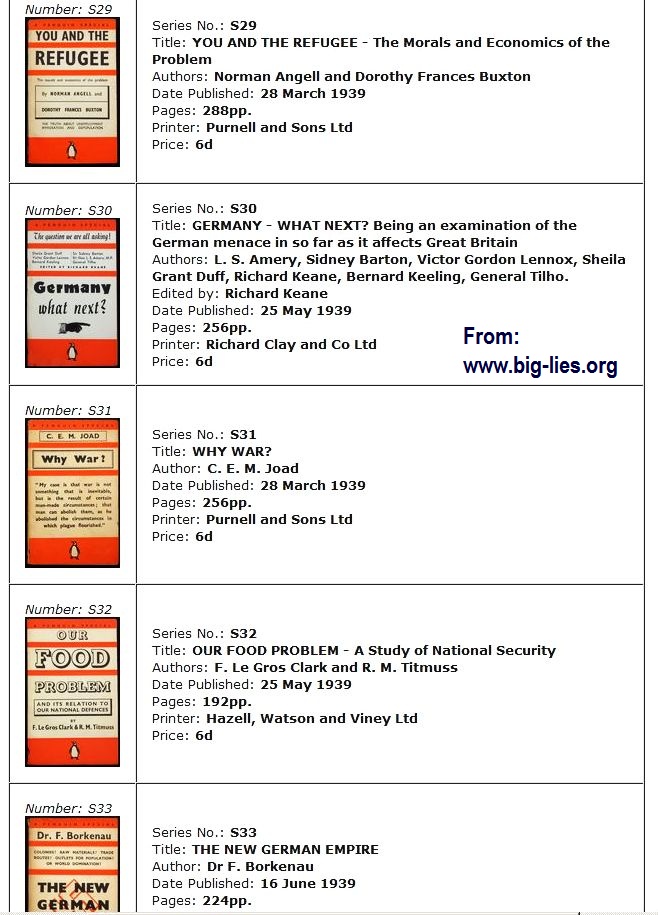
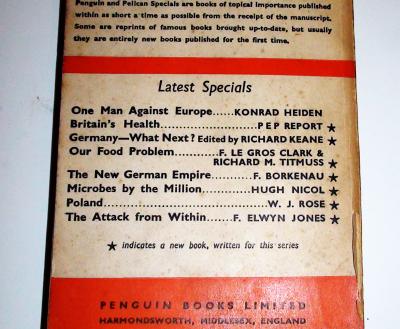 PENGUIN SPECIALS at the end of 1938. Picture (left) shows the back cover of Angell's THE GREAT ILLUSION - NOW, itself a Penguin Special. All these books were published by Penguin. Note that one book in the series—on Palestine—was cancelled. It's easy to guess reasons for this. Here's a rough guide to these eight titles.
PENGUIN SPECIALS at the end of 1938. Picture (left) shows the back cover of Angell's THE GREAT ILLUSION - NOW, itself a Penguin Special. All these books were published by Penguin. Note that one book in the series—on Palestine—was cancelled. It's easy to guess reasons for this. Here's a rough guide to these eight titles.• One Man Against Europe .. Konrad Heiden [Heiden is described on Wiki as 'an influential Jewish journalist and historian of the Weimar Republic and Nazi eras'. The title is obviously intended to suggested Hitler was alone, and to deny his immense popularity. My notes on his 1944 book on Hitler's Rise to Power was of course designed to hide Jewish activities: 'Jew Bolsheviks', Bela Kun of Hungary as a Jew, emigration e.g. to the USA, Nazi policies aren't indexed and are oddly underplayed. There is the traditional reticence about money (and also about Jewish censuses, though the author isn't averse to massive use of statistics in other contexts - see 513ff. Japan gets a few mentions with nothing that I could see on trade restrictions as a cause of war. It's unlikely Heiden was anything more than a hack, in the same tradition as Martin Gilbert.] • Britain's Health .. P E P REPORT ['Political and Economic Planning'. I haven't made much attempt to check on this pre-WW2 QUANGO. The obvious interpretation is that it's a Jewish-funded outfit to be used in Jewish control of Britain and its resources. Obviously it would have had to have been written to offer inducements for when the coming war is over.] • Germany - What Next? Edited by Richard Keane [Being an examination of the German menace in so far as it affects Great Britain. Authors: L. S. Amery, Sidney Barton, Victor Gordon Lennox, Sheila Grant Duff, Richard Keane, Bernard Keeling, General Tilho. No problem identifying the motivation here. And no problem identifying why Hitler's peace offers were unmentioned. Leo Amery was literally a crypto-Jew: he kept it secret, including his involvement with Balfour. Most of the others were Jews or Jew-connected.] • Our Food Problem - F. Le Gros Clark & Richard M. Titmuss [Foot shortage may have been another red-herring meme. Jews wanted control of food, by way of control of money. Here's Jensen on the 'World Food Shortage'.] • The New German Empire .. F. Borkenau ['Borkenau was born in Vienna, Austria, the son of a civil servant. As a university student in Leipzig, his main interests were Marxism and psychoanalysis' is a typical description. In fact he attended the Frankfurt School. He wrote 'The Communist International' (1938), 'a history which is also an analysis'. Obviously such a creature would never write an honest appraisal of Germany.] • Microbes by the Million .. Hugh Nicol [Hugh Nicol '... outlines a new philosophy of science ..' I'd guess the point here is to have expensive research institutes. Certainly this worked with Jews and the huge fraud of nuclear weapons, but the principle would be control. Biological warfare would be part of the work.] • Poland .. W. J. Rose [This seems to be William John Rose. I haven't seen this book (emails are welcome) but probably the author was yet another Jew. The book might cast light on official policy to Poland: Jews presumably wanted it to attack Germany, and hence Jews in Poland provoking Germany. And they would want bogus assurances from the British government. I'd guess this book was never reprinted, or heavily edited, after Stalin's Jewish controllers invaded Poland.] • The Attack from Within .. F. Elwyn Jones [Frederick Elwyn Jones, who at the time was a 30-year old barrister 'with experience of living in Germany', writes of 'German expansion and preparations for world domination, and the need for this expansion and the evils of Nazism to be stopped'. The last authorities he gives for the evidence he submits (he used Hansard, The Daily Telegraph and The Manchester Guardian a lot) are dated late May 1939. Just another rented prostitute, indifferent to millions of deaths.] The right-hand picture is taken from an Internet list of all the many Penguin Special titles. Note the publication date is given, down to the day. And the printers are quoted: presumably they had no option but to print propaganda, or Jewish clients would in future be closed to them. It's worth quoting a bit from H G Wells, on the Penguin Special 'The Jewish Problem' by Louis Golding which ignores completely 'the effect of this Chosen People cult upon the outside world'. [ Top of page ]
C N PARKINSON ON THE LEFT BOOK CLUB
[ Top of page ] [Here's more by Parkinson; well-written, but Jew blind: Parkinson on Marx, and on the Webbs] Appendix from Left Luggage (1967). Pagination from the paperback edition. C N Parkinson, famous for Parkinson's Law, wrote 'Left Luggage' as a rather unfocused anti-'left' analysis and protest. As anyone can see from the following appendix, Parkinson had no real idea of the part played by Jews in Britain's history and downfall. He had no idea of the start of the Second World War. For example, he describes Victor Gollancz as a 'humanitarian Jew'–something like the opposite of the truth. Parkinson had little idea about the subversion of socialism by Jews—though his book includes quite acute material on Beatrice and Sidney 'Webb'. He had no idea about Jewish control of money, and with infinite naivete assumes that Gollancz's books were subject to the normal problems of costs that apply to non-Jewish businesses. No doubt Gollancz was subsidised; and no doubt when their usefulness was over, after 1947, 'Left Books' were discreetly dropped. 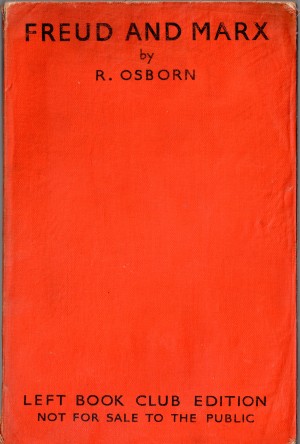 The intellectual life of the British Labour Party is fairly represented by the story of the Left Book Club. This was founded by Victor Gollancz in 1936 and reached its maximum membership of 60,000 in the following year. Some sixteen hundred discussion groups were organized and there was even a rally in the Albert Hall. Victor Gollancz (1893-1967) was a humanitarian Jew of great energy who had been managing director of Benn's, the publishing house which pioneered the sixpenny paperback. He founded his own firm in 1928 and had an immediate success with Journey's End by R. C. Sherriff. [Note: this was a lachrymose and sentimental look at deaths in the First World War trenches; a similar book was Neville Shute's On the Beach dealing with a hypothetical 'nuclear war'.] His aim in founding the Left Book Club was to make a synthesis of socialist ideas, create a Popular Front and 'stop Hitler without war'. Books published for the Club numbered about 247 in all, the first, Out of the Night, appearing in 1936 and the last in 1948. The volumes were accompanied and explained in a monthly periodical called Left News which flourished over the same period. Authors who contributed to the series included Sir Richard Acland, Clement Attlee, Emile Burns, A. Fenner Brockway, G. D. H. and M. I. Cole, Sir Stafford Cripps, Victor Gollancz himself, J. B. S. Haldane, Harold Laski, Philip Noel-Baker, George Orwell, R. Palme Dutt, Stephen Spender, S. Swingler and R. H. Tawney. The books published were mainly concerned with immediate events and have had little circulation in later years. George Orwell's book, The Road to Wigan Pier (1937), is perhaps the only Left Book Club work to be classed as a work of literature. The most prolific author in this series was John Strachey, with seven titles, next to him G. D. H. Cole with six and Victor Gollancz himself with four.
The intellectual life of the British Labour Party is fairly represented by the story of the Left Book Club. This was founded by Victor Gollancz in 1936 and reached its maximum membership of 60,000 in the following year. Some sixteen hundred discussion groups were organized and there was even a rally in the Albert Hall. Victor Gollancz (1893-1967) was a humanitarian Jew of great energy who had been managing director of Benn's, the publishing house which pioneered the sixpenny paperback. He founded his own firm in 1928 and had an immediate success with Journey's End by R. C. Sherriff. [Note: this was a lachrymose and sentimental look at deaths in the First World War trenches; a similar book was Neville Shute's On the Beach dealing with a hypothetical 'nuclear war'.] His aim in founding the Left Book Club was to make a synthesis of socialist ideas, create a Popular Front and 'stop Hitler without war'. Books published for the Club numbered about 247 in all, the first, Out of the Night, appearing in 1936 and the last in 1948. The volumes were accompanied and explained in a monthly periodical called Left News which flourished over the same period. Authors who contributed to the series included Sir Richard Acland, Clement Attlee, Emile Burns, A. Fenner Brockway, G. D. H. and M. I. Cole, Sir Stafford Cripps, Victor Gollancz himself, J. B. S. Haldane, Harold Laski, Philip Noel-Baker, George Orwell, R. Palme Dutt, Stephen Spender, S. Swingler and R. H. Tawney. The books published were mainly concerned with immediate events and have had little circulation in later years. George Orwell's book, The Road to Wigan Pier (1937), is perhaps the only Left Book Club work to be classed as a work of literature. The most prolific author in this series was John Strachey, with seven titles, next to him G. D. H. Cole with six and Victor Gollancz himself with four.Faithfully reflecting the mood of the period, the Left Book {185} Club publications are weakest in political theory. Readers were assumed (no doubt rightly) to be members of the Labour Party, loyal to the Webbs and needing no argument to sustain their faith. Socialist theory was thus represented by An Outline of Political Thought (1939) by S. Swingler, The Acquisitive Society (1937) by R. H. Tawney, and three works by John Strachey, Theory and Practice of Socialism (1936), Federalism or Socialism? (1940) and Programme for Progress (1940). After F. Allen had asked Can Capitalism Last? (1938) and after Stephen Spender had sounded the call Forward from Liberalism (1937), the socialist message came to an end. That, however, was where the Marxists began, for six of the publications deal with Marxism; one by Emile Burns, one by G. D. H. Cole and a third comparing Marx with Freud. Fourteen volumes in the series deal with Soviet Russia and another six with China, these last including Red Star over China (1937) by Edgar Snow and The Chinese Communists (1946) by Stuart Golder. One way and another, the Communist point of view is fully represented, finding some further expression in another seven books about the Spanish Civil War. But the Popular Front was to include the workers as well as the Communists. There are thus several books about Trade Unionism and one on the Co-operative Movement. More emphasis is given, however, to particular grievances, as Six Men of Dorset (1937) or to studies in the problems of unemployment. Most significant of these was Ellen Wilkinson's book about Jarrow, The Town That Was Murdered (1939). [Note added later: the 'Jarrow March' was a typical bit of Jew propaganda. In fact, there was little interest within Jarrow, and few people participated, I'm informed by inhabitants of the town, which was conveniently remote from London.] More telling still, however, were some of the attacks on Conservatism such as that implied in Tory M.P. (1939) by Simon Haxey. For the workers, again, there were included about twenty merely educational books, their subject matter ranging from eugenics to birth control, from chemistry to economic botany. For relaxation, finally, there were Poems of Freedom (1938) and the Left Song Book (1938). Less fortunate was the campaign to 'stop Hitler without war'. Books on foreign countries and foreign policy form, it is true, the most numerous section in the list. Countries {186} discussed include Austria, Czechoslovakia, Denmark, France, Greece, Eire and Poland. The country least mentioned is the U.S.A. Books denouncing the Nazi and Fascist movements number about twenty and include such titles as Hitler the Pawn (1936) by Rudolf Olden and Under the Axe of Fascism (1936) by Gaetano Salvemini. Denunciations came most loudly, however, from avowed pacifists whom any dictator could safely ignore. Book titles range from Battle for Peace (1938) by F. Elwyn Jones to Struggle for Peace (1936) by Sir Stafford Cripps. Victor Gollancz himself asked Is Mr Chamberlain Saving the Peace? (1939) and Leonard Woolf complained of Barbarians at the Gate (1939). The note of pessimism in Why Capitalism Means War (1938) by H. N. Brailsford was answered confidently by Eleanor Rathbone whose conclusion was that War Can Be Averted (1938). All this drivel was definitely harmful to British interests as well as to the cause (for what it was worth) of peace. An odd sequel was the Left Book Club contribution to civil defence; A.R.P. (1938) by J. B. S. Haldane, Protection of the Public from Aerial Attack (1937) by a group of Cambridge scientists, and How to be Safe from Air Raids (1938) by J. B. S. Haldane again. These publications reveal the general attitude of the Left towards international affairs. First, the country should disarm in the cause of peace, reducing the armed forces to a minimum and undermining the morale of the troops by assuring them that wars are caused by capitalists and arms manufacturers. Second, we should proclaim our undying opposition to the Nazi and Fascist movements in Germany and Italy. Third, we should interfere in the Spanish Civil War, supporting the 'government' against 'the rebels'. Fourth, we should strive above all For Peace and Friendship (1937) and, fifth, we should concentrate our main effort not on winning the coming war but on saving the civilian population from air attack. This was the road to Munich, if not to Wigan Pier. Towards the Commonwealth the attitude of the Left was indicated, first of all, by Alexander Campbell's book, It's Your Empire (1945). A certain responsibility was thus {187} assumed but the books on this topic reveal a lack of interest. Empire or Democracy by L. Barnes (1939) defines an alternative and Subject India (1943) by H. N. Brailsford suggests an attitude. Two other books about India with Left Turn Canada (1946) by M. J. Coldwell, and When Smuts Goes (1948) by Arthur Keppel-Jones, go to complete the Left Book Club's survey of the Dominions. The colonies are dealt with in one general work, Colour, Race and Empire (1944) by A. G. Russell and two books about Africa; one of them, by John Burgen, entitled Black Man's Burden (1943). Little interest was shown in Australia or New Zealand, in Malaya or the West Indies, and practically none in the Middle East except as illustrating the Jewish Question. Left Book Club publications were priced at 2s. 6d. each, implying a fairly large circulation. Membership remained sufficient, however, during World War II and up to the time of the General Election of 1945. With Labour in power, membership dwindled rapidly and stood at just over 3,000 when the Club's activities were brought to an end in 1948. The last volumes incurred a considerable loss and Victor Gollancz went on to campaign in other directions. What is particularly interesting about this story is the fact that the Left Book Club provided only the literature of criticism and revolt. The basic ideas dated from before World War I and each current problem was seen in the light of an accepted creed. Books in this series had a limited range of mythology and grievance, exhortation and attack. Without a Conservative government, the whole movement died away. It might, of course, be argued that the Club, by 1945, had served its purpose. This was true in a negative sense but the formation of a Labour government should in theory have led to an outburst of creative thinking. Labour's Plan for Plenty by Michael Young came in 1947 and the electoral triumph of 1945 should have heralded a spate of even more constructive proposals. The energies which had been absorbed in warfare were free now to build Jerusalem in Britain's green and pleasant land. Intellectually, however, the Labour Party had long since shot its bolt. [Note by rerevisionist: In fact, the Jews who funded the Labour Party had no interest in the white British. No 'constructive proposals' or 'creative thinking' for them!] The Left Book Club series tailed {188} away with duller books and fewer readers. Even a further and prolonged period in opposition failed to revive the Club, which is now no more than a memory. If Out of the Night (1936) by H. J. Muller marked the beginning of this series, we can see an equal significance in the titles with which it came to an end, namely Prisoners of Fear (May 1948), How Long the Night (August 1948) and, last of all, The Meaning of Marxism (November 1948). [ Top of page ]
Another Gollancz book in my possession is Harold J. Laski's Faith, Reason and Civilisation - An Essay in Historical Analysis (1944, with a preface written in 1943 from a small English village, Little Bardfield). It is a typically dull book. A small point of interest is a mention of J M Robertson's History of Free Thought and Christianity as 'binding' men. Another small point is that he discussed matters with 'Mr and Mrs Sidney Webb', though Beatrice Webb was dead by the time this book was published, and Sidney Webb (or whatever his real name was) had been made 'Lord Passfield' more or less fifteen years earlier. The book leaves a strange impression: Laski has the Jewish outlook that Jews alone matter; and his book omits any possibility that the war then raging could be anything other than necessary and anything other than a struggle of immense heroism against huge odds. It is psychopathological. Its strength is that to uninformed people—and wartime censorship ensured that was very many people indeed—it sounds utterly convincing. There is no instinctive evolved defence against lies of this sort in any artificial medium; defence has to be learned. It is entirely possible that Jewish evolution over time has bred a collective tribe of pathological actors. I'll quote a few passages browsed from the book:
The 'Right Book Club': Faked and Controlled Jewish Opposition [ Top of page ] 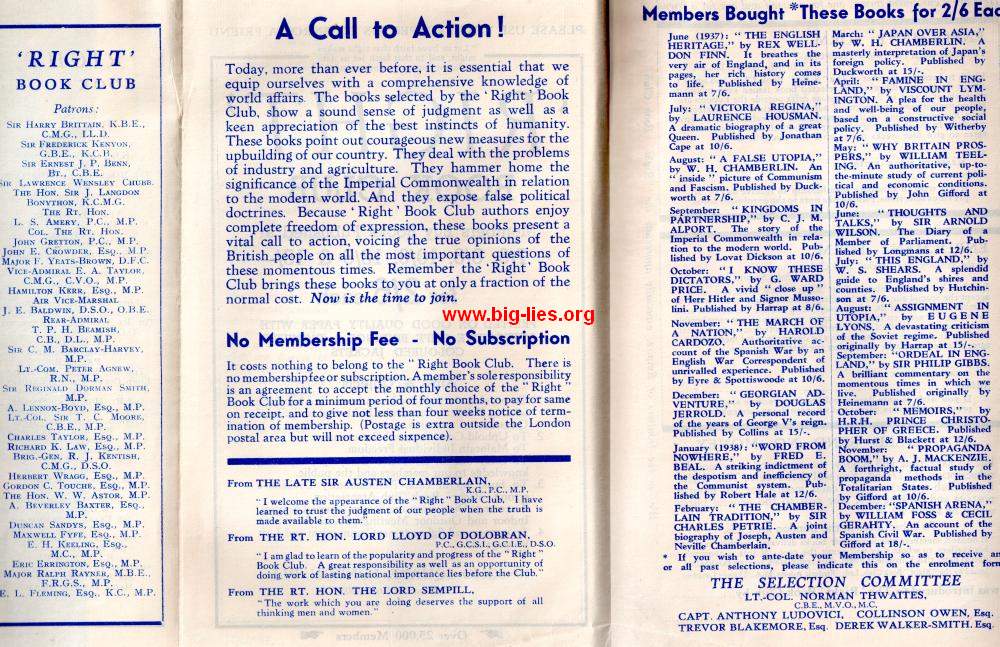 The Right Book Club. Above is a flyer probably from 1938: One of the books listed is Propaganda Boom allegedly by an A.J.Mackenzie, published in 1938. That book's blurb starts This book approaches problems of national and world politics from a new angle. It shows how human emotions are controlled and exploited by propaganda; how bloodless victories are won by the use of the psychological weapon which has become an invaluable ally of Statecraft. ... He discusses the great advance in the technique of propaganda since the Dictator States (especially Germany) began to build upon the foundations laid by Britain in the Great War; ... In fact, the book has nothing on new special techniques. It conflates Germany, Italy, the USSR and to a lesser extent Japan; there's no mention of Roosevelt, Churchill, Jewish finance, Jews in the USSR, or any of the other sinister gathering forces. The 'Right Book Club' (Over '25,000 Members') advertised: Members Buy Books Published at 7/6, 8/6, 10/6, 12/6 & 15/- for 2/6 each The series is clearly controlled opposition—none of the titles presents any serious consideration of world politics, militarism, Jewish policy. It is quite sickeningly dishonest, published purely to help warmongers insofar as they bothered with Britain. But the name suggests the club was invented to occupy an obvious publication gap with books mimicking serious comment. Judging by their flyer, these books were unsaleable at normal prices: Members Buy Books Published at 7/6, 8/6, 10/6, 12/6 & 15/- for 2/6 each. These prices are in shillings and pence, of which there were 12 to the shilling: 7/6d is three times 2/6d, for example. The titles are a sad mixture, probably aimed at middle class useful idiots: Queen Victoria, England's countryside, lightweight looks at Britain; plus titles on the Spanish Civil War and USSR Communism, with of course no mention of Jews; muted material on the British Empire, destined to go; and so on. These are worth studying as examples of what is meant by 'controlled opposition', in which Jews control a dialogue: not 'both sides', since the important material is entirely censored out; but what are presented as two sides—Hitler and Mussolini are 'these dictators', omitting Stalin; nothing about capitalism vs finance; nothing important about aristocracies. But 'Liberal' vs 'Conservative', 'Labour vs Conservative', or as here 'Right' vs 'Left', are givens. The only book which established a name was "Assignment in Utopia" by Eugene Lyons, A devastating criticism of the Soviet regime, not exactly first with the news, and which of course has nothing on the reality of Jewish control, and Jewish finance, notably from Jews in the USA and Germany. There's an enormous list of Patrons, Right Honorables, Sirs, Barristers, Rear-Admirals, Vice-Air Marshals, KGs, KCs, DSOs, MPs —probably to give an air of upper-class respectability, though I'd guess also suggesting the types who lent their names for a fee to shady company promoters. I notice the name of L S Amery, the very-crypto-Jew who wanted war. The five names on the selection committee are: Lt Col Norman G Thwaites, Capt Anthony Ludovici, Trevor Blakemore, Derek Walker-Smith, and Collinson Owen. A terrifying sad commentary on the intellect of Britain in the late 1930s. Wikipedia states: A "Right Book Club" was launched as a conservative response to the LBC in 1937 by Edgar Samuel, who worked for the bookselling firm Foyle's. Probably it was way for Foyle's to dump unsold books and their back catalogue; no doubt Edgar Samuel wrote a misleading circular, and collected public names to attach to his list. I wonder if they were annoyed.
[ Top of page ]
DIRECTORATE OF ARMY EDUCATION: BRITISH WAY AND PURPOSE [1942-1944]
[ Top of page ] 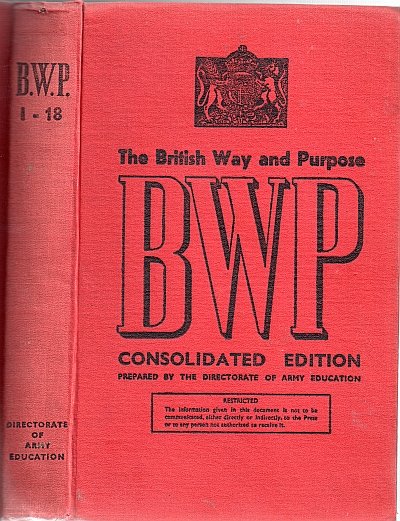 'Labour Party' is not in the index; looking back of course few people predicted the 1945 victory, and it seems fair to regard this as army propaganda. There's some interesting stuff comparing empires (absurdly, the British is here represented as tiny; in accordance presumably with the idea of telling them what they want to hear - there is no class in Britain, education is of the top quality, etc) and on supporting British economic interests in foreign countries (not worded like that) and Christianity and so on. Here's a contents list. Note the complete absence of anything serious on Jewish influences, for which these simpletons prepared to kill. The dates suggest this may have been aimed at least partly at Americans in Britain. BWP1 CITIZEN OF BRITAIN | BWP2 BRITAIN IN ACTION [Not original?] | BWP3 CITIZEN OF EMPIRE | BWP4 CITIZEN OF THE WORLD | BWP5 REVIEW | BWP6 THE SETTING | BWP7 THE RESPONSIBLE CITIZEN [Not original?] | BWP8 THE CITIZEN AT WORK | BWP9 THE HOME OF THE CITIZEN | BWP10 THE HEALTH OF THE CITIZEN | BWP11 EDUCATION AND THE CITIZEN | BWP12 WHAT MORE IS NEEDED OF THE CITIZEN? [Not original?] | BWP13 THE FAMILY AND NEIGHBOURHOOD | BWP14 PEOPLE AT WORK | BWP15 BRITAIN IN EUROPE | BWP16 YOU AND THE EMPIRE | BWP17 YOU AND THE COLONIES | BWP18 BRITAIN AND THE PEACE More on this in How the Master Race Won World War 2 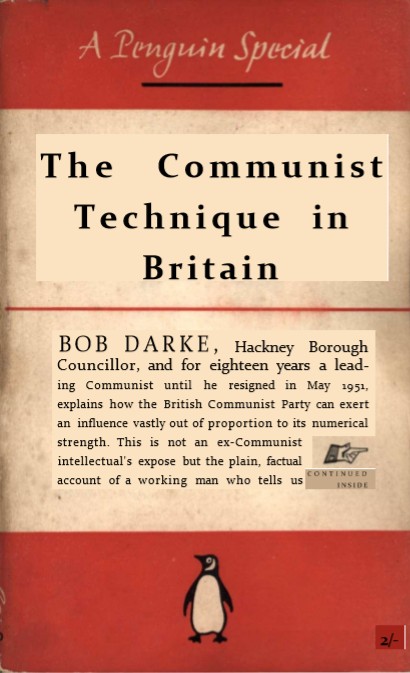 Post Script: 1952. 'Communism' (code for Jews). Penguin Special number S 160. Bob Darke [ Top of Page ]
Penguin Special (S160)—cover design right—was published in 1952, by which time Darke (real name not known to me) had been a Borough Councillor in Hackney for 18 years, before his resignation from the CP in 1951. In other words, he was a Councillor since about 1933. He must have been part of the Jewish movement supposedly against Germany, but in fact wanting war between whites in Europe.
It's online as a pdf file, less than 1MB: Click here for Penguin Special S160. It's worth noting that there must have been collusion with police, security 'services', MPs et al, just as now when these scum do nothing about white girls being raped, white boys being attacked, and so on.
RW: Finished version first upload 2015-01-24 to 28. Right Book Club added 2017-07-11. Home link 04-Oct-2017. Wells link and James Parkes Penguin added 5 Oct 2017. Unwin and Watts added 6 July 2018. Bieligk added 24 July 2018. Parkinson on Marx and the Webbs added 24 August 2018. Penguin Special S160 added 2 March 2020. Top of Page | ||||||||||||||||
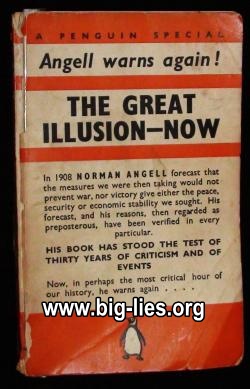
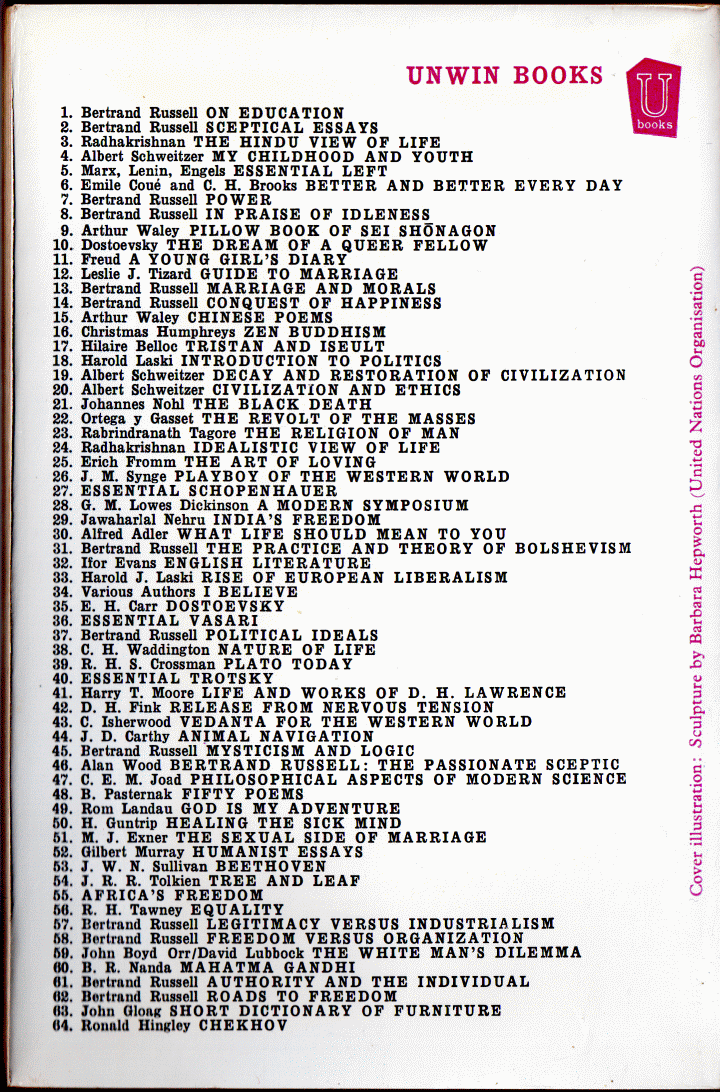
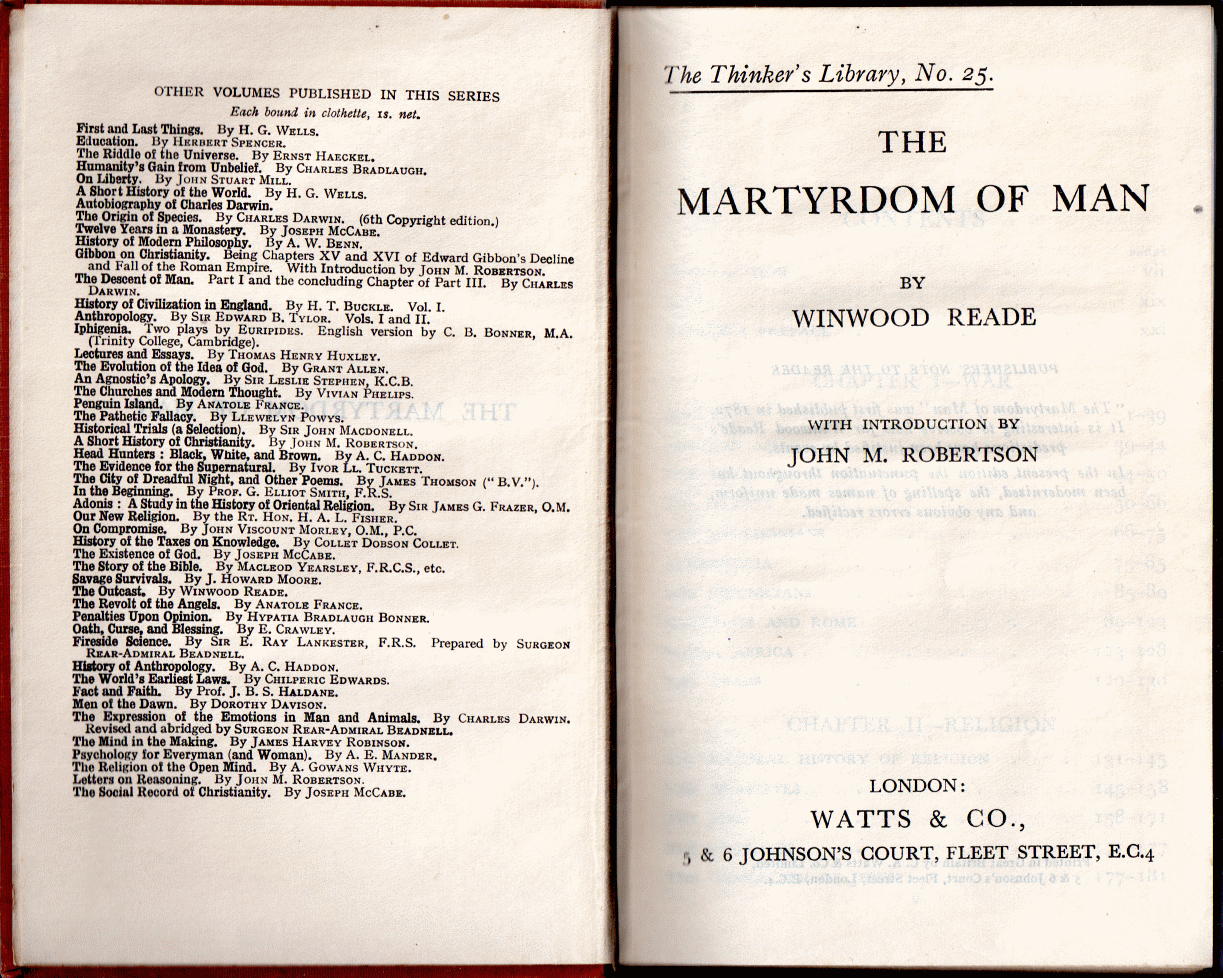
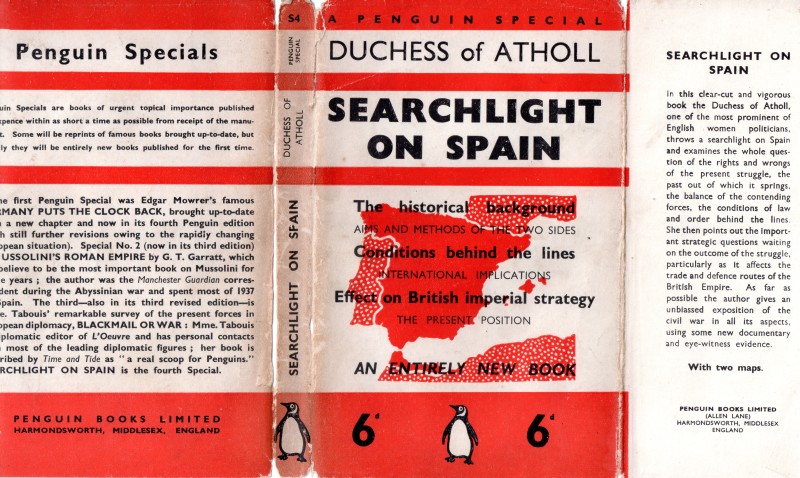
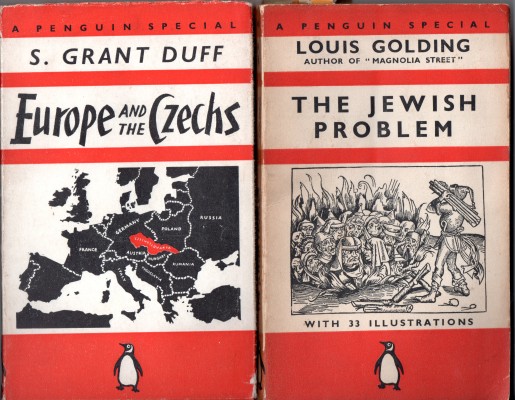
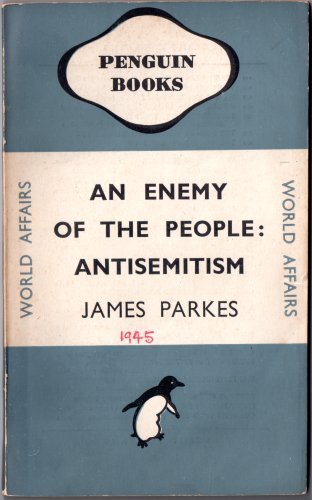
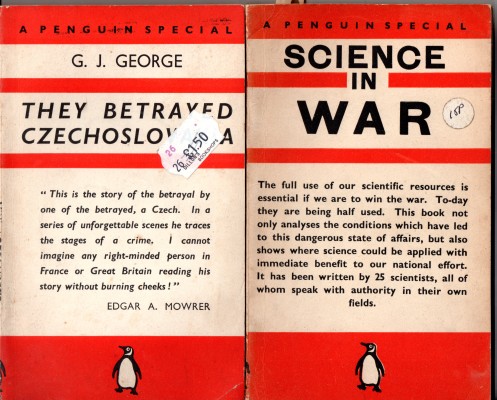
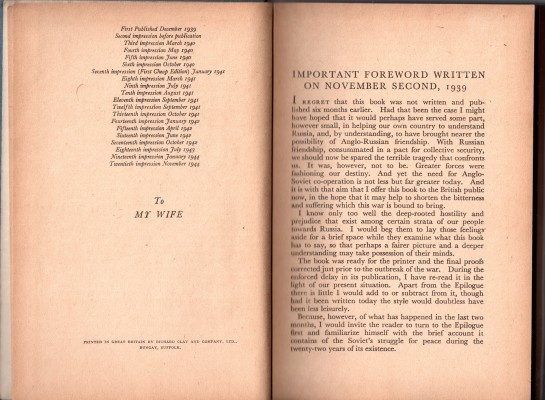
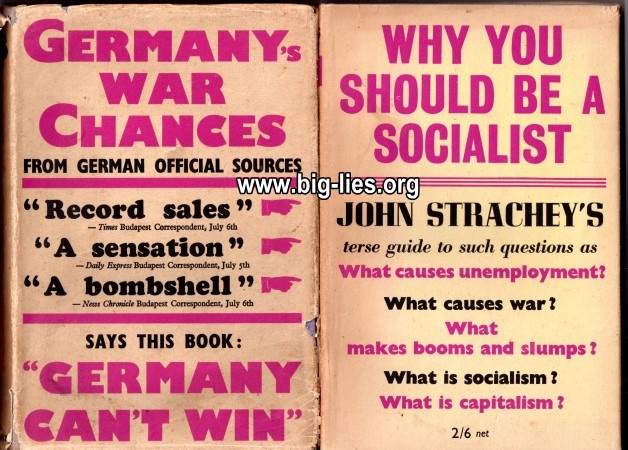
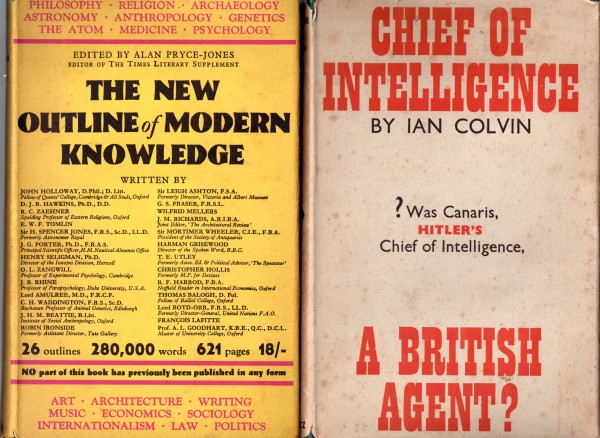
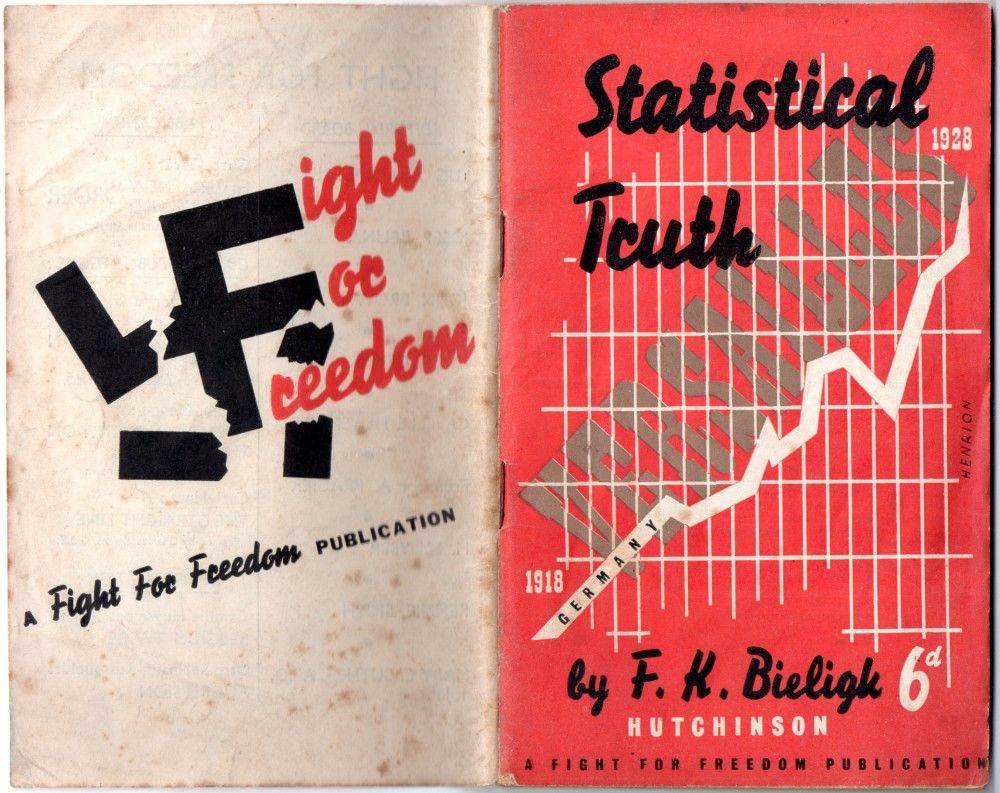
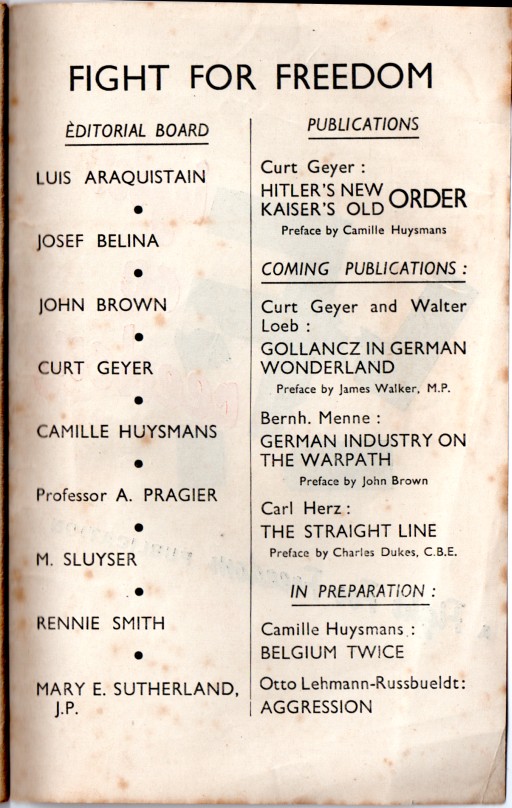 Jewish and fellow-traveller 'Editorial Board'
Jewish and fellow-traveller 'Editorial Board'